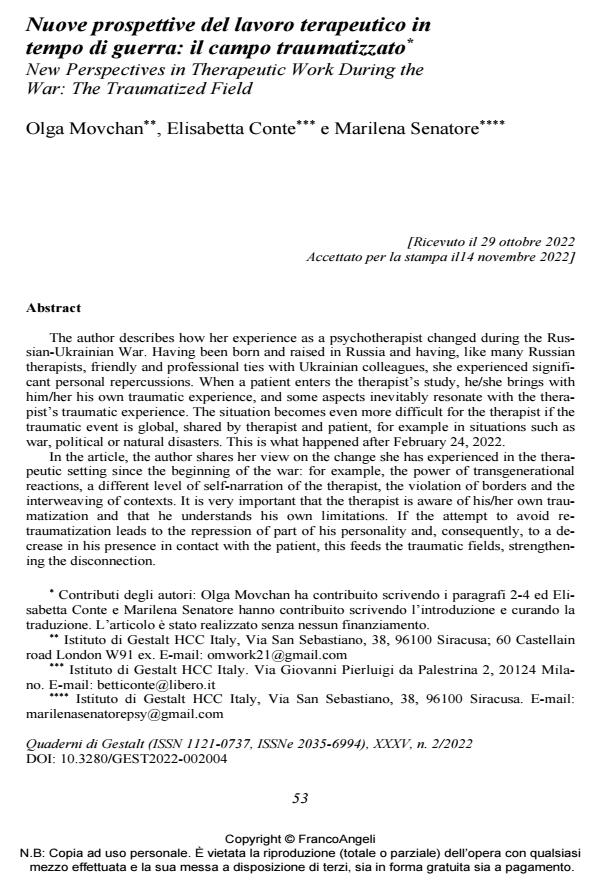New Perspectives in Therapeutic Work During the War: The Traumatized Field
Journal title QUADERNI DI GESTALT
Author/s Olga Movchan, Elisabetta Conte, Marilena Senatore
Publishing Year 2022 Issue 2022/2
Language Italian Pages 11 P. 53-63 File size 164 KB
DOI 10.3280/GEST2022-002004
DOI is like a bar code for intellectual property: to have more infomation
click here
Below, you can see the article first page
If you want to buy this article in PDF format, you can do it, following the instructions to buy download credits

FrancoAngeli is member of Publishers International Linking Association, Inc (PILA), a not-for-profit association which run the CrossRef service enabling links to and from online scholarly content.
The author describes how her experience as a psychotherapist changed during the Rus-sian-Ukrainian War. Having been born and raised in Russia and having, like many Russian therapists, friendly and professional ties with Ukrainian colleagues, she experienced signifi-cant personal repercussions. When a patient enters the therapist’s study, he/she brings with him/her his own traumatic experience, and some aspects inevitably resonate with the thera-pist’s traumatic experience. The situation becomes even more difficult for the therapist if the traumatic event is global, shared by therapist and patient, for example in situations such as war, political or natural disasters. This is what happened after February 24, 2022. In the article, the author shares her view on the change she has experienced in the thera-peutic setting since the beginning of the war: for example, the power of transgenerational reac-tions, a different level of self-narration of the therapist, the violation of borders and the inter-weaving of contexts. It is very important that the therapist is aware of his/her own traumatiza-tion and that he understands his own limitations. If the attempt to avoid re-traumatization leads to the repression of part of his personality and, consequently, to a decrease in his presence in contact with the patient, this feeds the traumatic fields, strengthening the disconnection. The author points out that some working methods have also changed. In some cases, the usual models and therapeutic values are inapplicable, if not dangerous. The idea of being fully aware of one’s own experiences, for example, or the process of unfreezing , or going through one’s own feelings, are all unenforceable things, particularly when working with volunteers who are in direct contact with refugees. Freezing is their natural adaptive response. At the same time, the retroflexion of feelings cannot leave no trace, and therefore it is important to find a balance between maintaining vitality and adaptive retroflexion of feelings, supporting and naming the experiences. It is important to draw on your own resources, rely on the sup-port of colleagues, turn to supervisors and intervision groups. In order to be with each other, it is necessary to maintain balance and continue to find the resources to work in a traumatic field.
Keywords: Traumatic field, Gestalt therapy during the war, therapist’s re-traumatization, transgenerational trauma, supervision.
Olga Movchan, Elisabetta Conte, Marilena Senatore, Nuove prospettive del lavoro terapeutico in tempo di guerra: il campo traumatizzato in "QUADERNI DI GESTALT" 2/2022, pp 53-63, DOI: 10.3280/GEST2022-002004